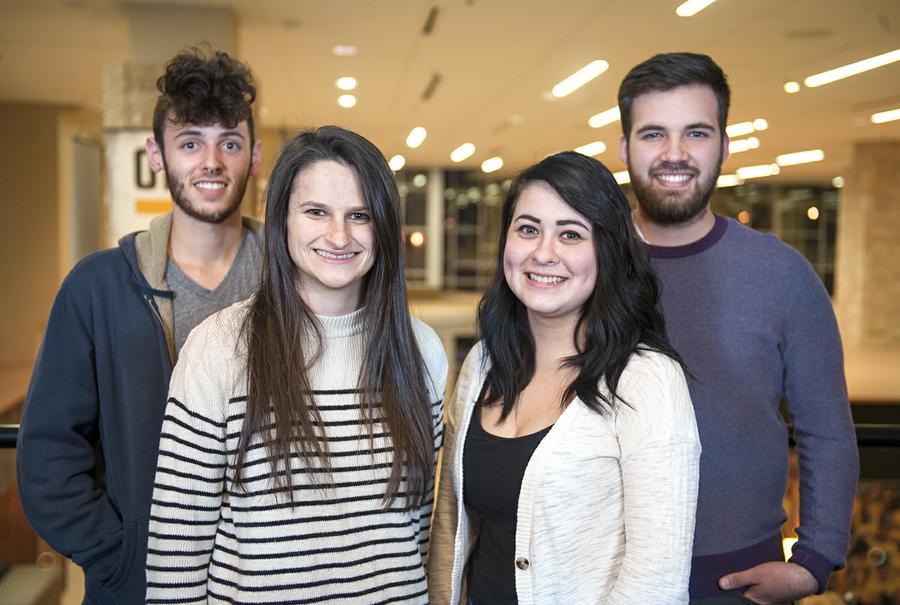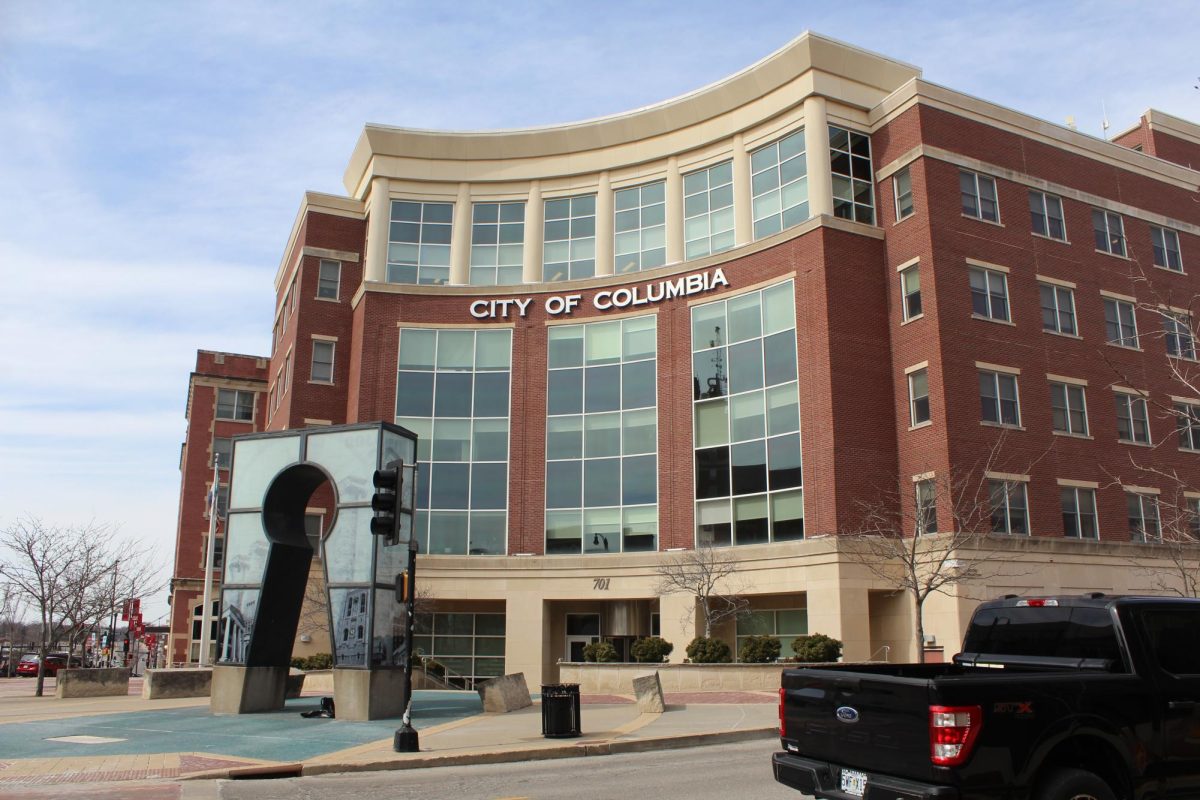Proud Tigers Mentorship Program is a queer-focused mentorship program run through the LGBTQ Resource Center aimed at connecting younger students with opportunities on campus relevant to them.
The program pairs freshmen or new students with older mentors with similar interests or identities. While the emphasis of the program is on the LGBT community, program organizers said anyone can apply.
Fall 2014 was Proud Tigers’ pilot semester, and the program welcomed 21 mentees and 23 mentors.
“We’re trying to be one-on-one for the students on campus who don’t know where to go yet,” LGBTQ Resource Center coordinator Struby Struble said. “No matter how welcoming our center is, it’s still a singular person walking into a room with lots of people in it. So if we have a set one-on-one connection, it’s a lot easier for people to access the resources and get the information that they need.”
Struble said Proud Tigers is open to any marginalized group who wants to find a “group that makes sense for them.”
“Because it’s housed at the LGBTQ Resource Center, we do get a lot of people who identify as LGBTQ or are questioning those identities,” she said. “But … if someone came in and was looking for where their chess group was, the mentors could say, ‘Well, here’s this chess group and this class that deals with chess and here’s this history class that talks about how chess has influenced history.’ Wherever their interest is, we would try to fill that.”
Struble remembered that the idea for a mentorship program became serious when three members of Triangle Coalition attended the Midwest Bisexual Lesbian Gay Transgender Ally College Conference. She said they planned each week for an entire year before launching Proud Tigers.
“I first started talking about starting a mentorship program in fall 2013,” said Daniel Stribling, one of the founding students. “One thing I found at a lot of universities which have really strong LGBTQ resource centers is that they had mentorship programs, so I went from there and contacted people to see how other programs run. From that point, we had a few other students get really involved, and we started meeting weekly to plan and structure a mentorship program that would better fit our students that we have on campus.”
Stribling, who did his undergraduate practicum as a social work major at the Resource Center, drew on the LGBT mentorship program at the University of Southern California when planning Proud Tigers with co-founders Joel Dalton and Duy Nguyen.
He said he wanted the organization to focus on the specific needs of the resource center’s students.
“A lot of mentorship programs on campus are very broad, but we wanted to specifically create a program that values the identities that people hold and help people explore those identities while also dealing with all the other things we do on campus as students,” Stribling said. “We used the resources we had to create something that we thought would be valuable to our students. The center is really a scary place for students at first, so helping them feel like they have a place is important.”
The student founders created the program so that it would not leave any group or individual out, Struble said.
“We understand the fluid nature of identity, and we realize that people may change their identity over time or not know their identity,” she said. “So we’re trying to give them a space to have a one-on-one connection with someone on campus who is aware of social justice issues, and specifically (LGBT) issues, and who tries to be aware of everything. Then they planned for a full semester before they tried to get it off the ground. They laid a strong foundation so that it could be successful.”
Junior Cat Cojocaru, a mentor in the program, said there are students of all identities in the program.
“We have kids who are out, we have kids who are not out at all,” she said. “We have people who are just allies and want to know more. I think it’s valuable to get to know so many different other kinds of people in the program because we have all kinds of identities across the board, and you learn more about yourself by interacting with these people, and you learn more about the community as a whole, too.”
Cojocaru’s mentee, with whom she met formally once a month last semester, accomplished her goals and connected with new people, she said.
“She wanted to get more involved on campus, and I don’t take any credit for what she’s done, but she’s definitely been able to do that, and I think that’s awesome,” Cojocaru said. “We have little socials, potlucks and things like that, and we do a bunch of different fun things to get to know each other and let the mentees get to know people who are similar to them.”
The mentee application provides space for applicants to describe what they are looking to get out of the program.
“I think that a lot of students have found it really valuable and have taken ownership of this program,” Stribling said. “I see us growing as the semesters go on, and I see us doing more things. We will hopefully be able to have more activities and events and reach out more to campus.”
Proud Tigers also helps students navigate the process of coming out.
“A lot of mentees have found it valuable because for some who have not come out to family and friends yet, they’re able to have a confidential space where they can meet with someone who has a similar identity and has gone through that,” Stribling said. “It’s really valuable for them to talk to someone and ask for advice and find out how it worked for them. It’s really helpful to have that ally who is on their side the whole way.”
He also said he thinks the program helps foster future leadership on campus, as many of the mentors are also leaders in social justice organizations.
Struble said Proud Tigers members last semester developed “very strong” relationships, which she hopes will continue as the program does.
“The first semester went amazingly,” Struble said. “I love everything so far. That mentoring piece is successful. People have done what we wanted, and that is access the space and access the resources, because they had that one person to bring them in. I don’t think it’s perfect yet, but I think it’s exciting that we can pinpoint how to improve and how to move forward.”
Stribling said the program’s organizers learned a lot from student feedback in the first semester.
The mentorship program is valuable to mentees and mentors alike, Struble said.
“I think because they’re so much to know in the world, we focus on how much we don’t know,” she said. “And when you’re put in a role like a mentor role, it forces you to see how much you do know. And so I think the mentors were able to see how much growth they had and how much they know about campus and how much they’re able to give back in a formal way. A lot of us got to where we were because we had those mentors formally but also informally, so I think it’s nice to have a formal outlet to pay it forward and pay it back.”
Cojocaru, who is returning to the program as a mentor this semester, said she hopes to continue helping students.
“I hope (Proud Tigers) stays on campus as a big force along with the other LGBTQ groups and orgs as a way for people who may not feel comfortable at first to start finding their niche and finding people they can really connect with,” she said.
####Q&A with the Proud Tigers
**Cat Cojocaru, Mentor – Junior – Strategic Communication/Political Science – Rochester, Minnesota**
_What is the goal of Proud Tigers?_
To help (freshmen or new students) transition to the university and achieve any goals they may have about grades, social life or anything at Mizzou.
_Why did you join Proud Tigers?_
I like being involved on campus, and I care about LBGT issues. As a member of the queer community, I really think that we’ve made some great progress but there are so many things we could be doing to make campus more inclusive. As a freshman, I didn’t really know which way was up or down, and if I had someone to show me the ropes, I would have been more comfortable faster. I love Mizzou now, but as a freshman, I was pretty lost.
_How does Proud Tigers match mentees and mentors?_
They match you based on your interests and identities. You’re encouraged to go over whatever goals they may have for that semester and talk about what you can both do to try to accomplish them.
**Hannah Feagan, Mentee – Freshman – Undeclared – Joplin, Missouri**
_Why did you join Proud Tigers?_
I joined Proud Tigers for a few different reasons. I wanted to get more involved with the LGBTQ Resource Center, and thought it was a great opportunity to get to know other members of the center in a very interpersonal manner. I also needed guidance in terms of knowing how to present my sexuality on campus, as I didn’t know if Mizzou was an accepting environment for the queer community or not. It seemed like a fun and completely new experience to get involved with, so I decided to give it a try.
_How has the Proud Tigers experience been so far?_
My experience as a freshman in the Proud Tigers program was a very positive one. It helped me meet new and similar people to myself, which was definitely the most beneficial aspect of the program.
**Shannon Greenwood, Community Outreach Coordinator – Senior – Print and Digital Journalism – Omaha, Nebraska**
_How did you get involved with Proud Tigers?_
I first got involved last spring while I was studying abroad in Brussels. While over there, I saw on Facebook that Joel (Dalton) had posted something about Proud Tigers and how they were beginning to start the program, and I knew I wanted to be a part of it in some way. I reached out to Joel about wanting to be a mentor, and he came back to me with a better offer — a position on the executive board as the community outreach coordinator. I jumped at the chance, because I really wanted to give back to the LGBT community on this campus that gave so much to me when I was trying to find myself when I first came to Mizzou.
_How has the Proud Tigers experience been so far?_
The Proud Tigers experience has been really incredible so far. In our first year, we’ve recruited some of the best LGBT — and ally! — leaders on campus to be mentors, students who I’ve been inspired by tremendously during my four years at Mizzou. To have such an impactful group of mentors helping the next generation of social justice leaders on campus is incredible, and I love that I’ve gotten the chance to be a part of the beginning of this program.
**Christiana Marvray, Mentor – Senior – Biological Sciences/Women’s and Gender Studies – Redondo Beach, California**
_How did you get involved with Proud Tigers?_
I first got involved because my good friend Joel Dalton brought up the idea of starting a mentorship group sometime at the beginning of last year. I was immediately interested in becoming involved, because I love the thought of passing on knowledge and confidence through mentor/mentee relationships.
_How has the program benefited your mentee?_
The program benefits my mentee because of the sense of community that it brings them. Knowing that there are other like-minded queer people at Mizzou is a really comforting thing for people from small towns or for people whose friends aren’t quite comfortable with their sexuality.
_What was your experience as a freshman like?_
My experience as a freshman was mostly positive here at Mizzou, because I immediately joined a sorority and was embraced by a lot of really awesome women in sisterhood. Things got more difficult for me when I started to realize that I identify as queer, and I didn’t really know of any resources for queer people in Greek Life. When I began working at the Women’s Center and stepped outside of my box, I ended up meeting a ton of people outside of and within Greek Life to support me.
**Shane Stinson, Mentor – Senior – Psychology/Women’s & Gender Studies – Brentwood, Missouri**
_Why did you get involved with Proud Tigers?_
I got involved to help new students navigate and fall in love with Mizzou’s campus. As an LGBT student, it can be difficult to feel at home at Mizzou. My goal was to be a friendly face here reminding them that they were important and part of this campus.
_What was your experience as a freshman like?_
My experience as a freshman was challenging. I didn’t truly feel like Mizzou was my home or that it ever could be. I wish I would have had someone telling me about inclusive resources, events and organizations so I could have found a community sooner. LGBT student experiences are unique, and I’m so thankful this program exists to create connections that will allow students to start feeling important on this campus as soon as they get here.
_How does the program benefit you?_
The program benefits me because I get to hear life-changing and inspiring stories from students. I love getting to know new people, and I love being able to help students in any way possible. Impacting students’ lives is fulfilling to me.
**Kayley Weinberg, Mentor – Senior – English – O’Fallon, Missouri**
_Why did you get involved with Proud Tigers?_
I got involved because a large part of my coming out process involved mentor-mentee relationships. My mentors are a huge part of my life and have helped me become comfortable in my skin. Proud Tigers gave me the opportunity to pay it forward and help others the way my mentors helped me.
_How does the program benefit mentees?_
This program gives mentees someone to confide in and someone to look to for a variety of things. Mentees have someone who is devoted to their well-being, and able and willing to provide help in a variety of ways, whether that be advice, personal experiences or simply a listening ear. Mentees can relate to their mentors by sharing in their hardships and celebrating their victories.
_How does the program benefit mentors?_
This program benefits mentors because it gives purpose to their experiences by allowing them to share their experiences with people as guidance and encouragement. It benefits both mentees and mentors because it makes the LGBT community stronger and more tightly knit and purposeful.







